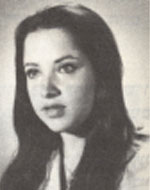Salant, Judith (Dita)
Yehudit (Dita), daughter of Malka and Yitzhak, a descendant of a Jerusalem family that immigrated to Israel two hundred years ago, was born on February 26, 1954, in Netanya. She studied for three years at a Jewish elementary school in Vienna, Austria, where her father was sent as a representative of the Jewish Agency. Afterward, the family returned to Israel and Yehudit continued her studies at the Nahman Bialik Elementary School in Netanya. After that she graduated from the Moshe Sharett High School. Dita was a figurine of color and shape, of movement and sound. When she was in Austria she studied dance and ballet at the public school near the Vienna Opera. She played the piano and her listeners finished their praises. She later composed compositions. But most of her interest was in drawing. From an early age, she painted in oil, gouache, and water colors. Well-known painters stood up for her talent for expression and for the intense power that bursts out of her paintings. Her paintings were later exhibited in amateur artists’ exhibitions, organized by various institutions. Some still adorn the walls of her parents’ home. She also captured the strength of her soul in songs. In the way of artists, she was delicate and sensitive, and yet she had the virtue of youth. Dita was friendly, surrounded by many friends who had a vibrant social life. By nature it was a presumption of character. Although at a young age she was sent from the small city of Israel to the foreign city, with its foreign language, its various customs and its bitter cold, she quickly assimilated into her new life. Her friends were impressed by her honesty. She hated hypocrisy and was not afraid to say what she felt to everyone, including her parents, friends and educators. Yehudit was drafted into the IDF in August 1972. After completing her basic training, she was sent to a course for clerks and clerks. She was later assigned to the Gunners School as a clerk. Her commanders said she was sociable and quick-minded, and that she was devoted to her job. When the Yom Kippur War broke out, she demanded that she be sent to the battle zone, claiming that “I can not remain on the home front while all my comrades are fighting for their lives.” She said and did. She went to her fellow fighters and encouraged them, but she ignored it from her family. As the day after her discharge from the regular service drew closer, she prepared for the entrance exams to the Bezalel Academy of Art. On the day she was about to leave for the holiday of liberation, Yehudit fell in her role in the south and was brought to rest in the military cemetery in Netanya, leaving behind her parents and brother. Her family discovered songs about death in her estate, and in the poem “she” she wrote: “The work is gone, it is no more / the vanity has passed, only the spirit is left. “The line was stretched, only the page was left, / The lightning caught her / The hand caught her / The fire whispered to her … / She is no more …” In a letter of condolences to the bereaved family, he wrote The commander of the unit: “The fresh spirit, the quietness and the thoroughness of her work, her manner and manner, were an example to all her friends and commanders.”
